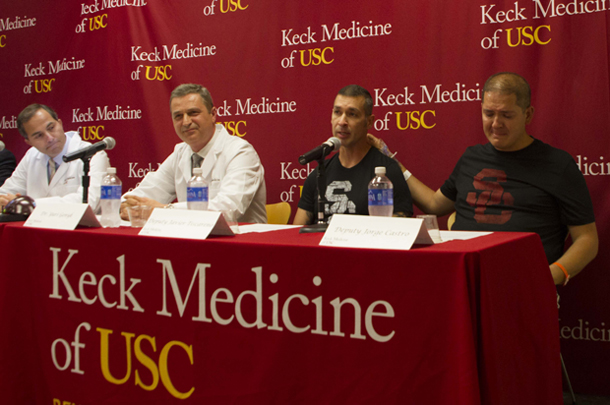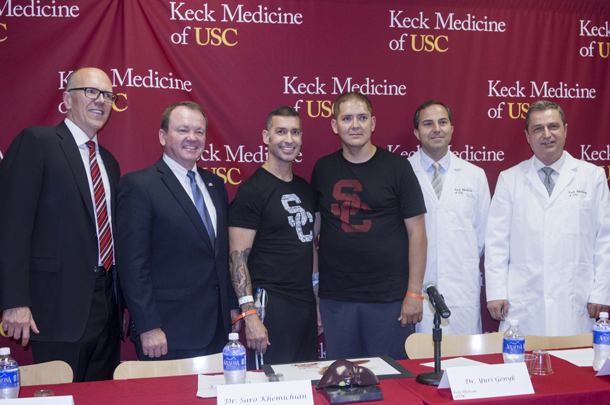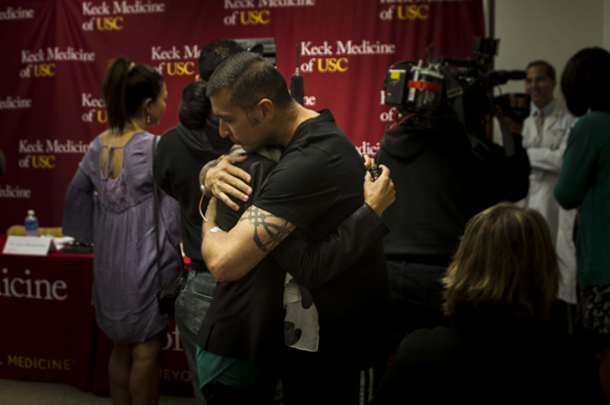It’s a story that began with a conversation on a treadmill, led to an operating room table and ended with the gift of life.
For veteran Los Angeles County Sheriff’s deputies Javier Tiscareno and Jorge Castro, it’s a story of friendship, extraordinary generosity and perseverance in the face of terminal disease.
“He’s given me life,” Castro said a week after undergoing a successful operation to replace his diseased liver with part of Tiscareno’s. “It’s something he did out of his heart, and it’s something that I will never be able to repay.”
The two law enforcement officers took part in a living donor transplant performed June 4 at Keck Hospital of USC during which Tiscareno donated part of his liver to save Castro, who had been diagnosed with a rare illness that was attacking his own liver.
Donning black USC t-shirts, Tiscareno and Castro shared their story June 11 during a news conference alongside Keck Medicine of USC CEO Tom Jackiewicz, Los Angeles County Sheriff Jim McDonnell and physicians Saro Khemichian and Yuri Genyk.
McDonnell thanked the physicians and nurses at Keck Medical Center of USC, calling the transplant a “tremendous story.”
“Somehow, everything aligned,” McDonnell said. “It’s one of those things that only happens in the movies.”
He added: “To think that a week ago, this surgery was undertaken and today both of our deputies are able to walk into this room — I would say it’s a miracle.“
Castro, a 14-year veteran of the Sheriff’s Department, received a diagnosis in January 2014 of primary sclerosing cholangitis, a rare autoimmune disease that attacks the liver’s bile ducts. Castro’s liver was quickly failing. His health situation was dire.
“We realized very soon that there was no cure for this and he needed a liver transplant,” said Khemichian, MD, assistant professor of clinical medicine and transplant hepatologist. “We were facing an uncertain future.”
Castro was put on the liver transplant list, but his outlook was grim.
“With the way this disease is, he wasn’t going to get a transplant any time soon through our usual means,” Khemichian said. “We discussed with him the possibility of a living donor.”
USC surgeons have performed nearly 300 living donor liver transplants since pioneering the procedure in May 1999, when the first living donor transplant between two adults in California was successfully completed.
Despite his terminal diagnosis, Castro continued to go to work at Twin Towers Correctional Facility in downtown Los Angeles, where he works with Tiscareno, an 18-year department veteran.
The two deputies where exercising on treadmills when Castro mentioned his illness and his desperate need for a new liver.
“(Tiscareno) is a big jokester and he told me, ‘Let’s do it this Saturday,’” Castro said. “I said ‘I’m not fooling around. This is serious.’ He stopped his treadmill and said, ‘I’m not fooling around either.’”
The two men talked, and Tiscareno soon decided that if he was a match he would donate part of his liver to his sick colleague.
“I’m just so thankful,” Castro said.
Tiscareno called his wife, Carmen, to discuss his decision. Although she was initially hesitant, she supported him. Tiscareno contacted USC physicians to begin the testing process. He soon learned he was an ideal candidate.
“After learning that I was a match, I said, ‘Let’s get this done,’” Tiscareno said. “I could already see the wear and tear on Jorge. It was my understanding that timing was of the essence.”
Genyk, MD, associate professor of surgery and surgical director of the liver transplant program, Keck Medicine of USC, said that living donor liver transplants are possible because the human liver can regenerate itself from healthy tissue. During the 11-hour surgery, Tiscareno had about 60 percent of his liver removed. In about two months, the livers of both men are expected to grow back to their normal size.
“The operations went successfully and both deputies have recovered,” Genyk said.
The deputies have received hundreds of letters of support from well wishers and have gone on to form a strong bond. They are expected to return to work once they make a full recovery in about two months.
After the surgery, Castro’s young children visited Tiscareno in his room at Keck Hospital to thank him for saving their father’s life.
“That gave me so much happiness,” Tiscareno said. “I’m thankful to have him here. May the rest of his life be long, healthy and prosperous.”
— Douglas Morino




